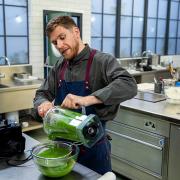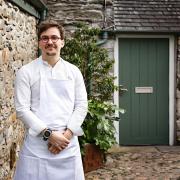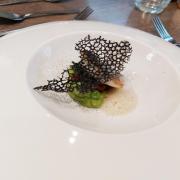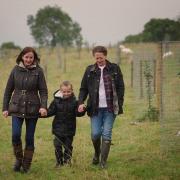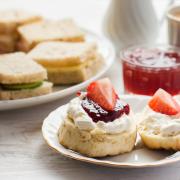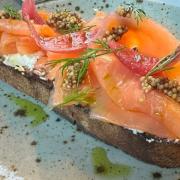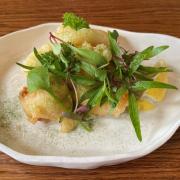Foot and mouth forced a family of Lancashire farmers to change their business - and they’ve never looked back. Alice Wilkinson reports

Twenty years ago, West Lancashire cereal farmers Roger and Bernie Webster brought ten calves home to their farm in Lathom to begin a small weekend venture.
Today, if you follow the gentle murmur of mooing and the soft scuffle of hooves on hay you’ll find, milling happily in their spacious cattle shed or roaming the neighbouring field, a herd of 130 Limousin and Belgium Blue bullocks and heifers. While they still grow cereals, beef farming is no longer just a weekend project for this husband and wife team.
In 2009, with hands-on help from their four children Andrew, 30, Louise, 28, Joe, 26 and Tom, 25, the Webster family opened Taylors Farm Shop with a beautiful, purpose-built food hall showcasing their own quality beef, alongside an array of fresh local produce.
‘At first, Roger and I saw it as a bit of fun. The kids named a heifer each, we reared them and sold them on at nearby markets,’ smiles Bernie, or ‘Ma Webster’ as she is known to her staff. ‘When foot and mouth disease infected British farms, the local livestock markets were closing down and we were having to travel to markets further afield. So, we started butchering the animals ourselves and sold the beef to friends and family but it wasn’t long before we found ourselves with more meat than we could shift.’

Dusting off one of their disused barns, they set up shop selling the surplus beef. They revived the space with a fresh coat of paint, fitted a three-foot wooden plank to use as a counter top, hand-painted a sign to put outside and a trickle of customers began arriving. By the following Christmas, queues were out of the door into the car park. ‘We put up three party marquees for shelter,’ says Bernie, ‘I had the shop girls handing out chocolates to waiting customers. I was so worried the queues would put them off, but they never stopped coming.’
It was at this point that the family made the decision to invest in a purpose-built farm shop to cater for their expanding customer base and they contracted craftsmen from nearby Standish to build Taylors Farm Shop as it stands today.
Step inside to peruse the neat rows of shelves filled with jars of chutneys, jams and pickles, the deep wicker baskets overflowing with fresh fruit and vegetables (the broccoli, kale and cabbage is grown by Roger’s cousin in Lathom, the carrots and mushrooms are from nearby Scarisbrick) and the impressive meat counter laden with free-range chicken, handmade sausages, hand cut joints of pork, and lamb and beef, that has been reared and butchered on site at the farm, in every cut imaginable. ‘We never imagined that the business would grow this much,’ Bernie explains, ‘but, when our customers asked for chicken, for bread, for ice cream, we wanted to deliver. Roger and I have grown up here and lots of our friends work in agriculture, so we know exactly where to go to source the best quality items.’
Most of the produce that Taylors stock is, where possible, supplied by Lancashire based businesses; from loaves of bread baked by Greenhalghs in Bolton, homemade apple pies by Williams Pies of Preston, and Mrs Dowson’s ice-cream from Blackburn to free-range eggs from Burscough and milk from Rowlands Dairy in Mawdesley. The delicatessen boasts a selection of homemade savoury pies filled with peppered steak, minted lamb or ham and chicken and a range of salads and prepared vegetables that is updated regularly by the talented team of onsite chefs wanting to use the best of the season’s ingredients.
Even the busy farm shop and the deliveries that arrive daily from local suppliers do not detract their focus from the wellbeing of the beef cattle and the quality of the meat; from calf to abattoir, rearing a herd is a labour of love for the Webster family and their team of staff. With predominantly Limousin cows and some British Blue, their herd displays a wondrous contrast of breed, colour and size. The Limousin, a silky brown (sometimes black) haired French breed with characteristically good fertility, mix happily with the large, white British Blue whose muscular appearance deceives their quiet temperament.
This care has direct benefits on the quality of the meat produced; they are fed on expertly prepared, home-grown grass which is cut short and seed, which is crushed, so that the animals’ stomach can absorb the nutrients with ease. Their cattle shed is tucked behind the farm shop, away from the thoroughfare of cars and people, to provide a serene atmosphere and ensure stress levels are kept to an absolute minimum. If the animals’ muscles are relaxed, the meat will be tender. In the summer months, they are free to roam the neighbouring field but, in the winter, as soon as the muddy ground begins to aggravate them, they are moved into the warmth of their cattle shed where their bedding is changed each night.
Once they have reached maturity, at 20 months, the herd is transported to an abattoir in Cheadle, Cheshire. Roger and Bernie chose this particular abattoir because, on arrival, the herd are able to relax; they are kept together, separated from other farmers’ cattle and allowed to rest for 48 hours. Afterwards, the meat is then hung for a minimum of 21 days before the team of butchers at Taylors Farm Shop expertly cut the tender meat off the bone, experimenting with new cuts for the customers to try.
‘Our priority is always quality,’ says award winning head butcher, Steve Perrins. He is in charge of training the apprentices on site in the Farm Shop’s butcher. Coaching them all to his incredibly high standard, there have been a number of huge successes including Ben Peel who, has now completed his apprenticeship, and, in 2013, was awarded the Lord Graham Award for Endeavour which was presented by Princess Anne at The Butchers’ Hall in London. Roger and Bernie support the scheme, and their trainees, wholeheartedly; there are two apprentices training onsite at present and the family have plans to convert an upstairs room into a specially equipped butchers’ training room. ‘We are lucky to have very gifted butchers who care passionately about their work,’ says Bernie, ‘they want to teach their skills and pass on their knowledge to the younger ones and we want to facilitate that.’
It is ten years since Roger and Bernie started selling beef out of one of their barns and, over a hundred since the Webster family acquired the 300-acre farm in Lathom and still, despite its unpredictable growth and success, Taylors Farm Shop has all the charm of a small, family business with staff who share a passion for the art of fine butchery and quality food.




